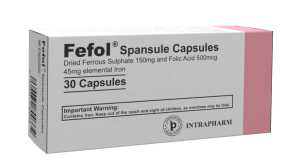


Fefol Spansule – A Trusted Iron Supplement for Treating Anemia
In the world of medicine and nutrition, iron is recognized as one of the most essential elements for human health. It plays a vital role in maintaining wellness, enhancing organ function, supporting muscle performance, and strengthening the immune system. Iron deficiency can lead to serious health issues, including anemia.
This section explores the benefits of iron supplementation, particularly Fefol Spansule, and discusses the causes and prevention of iron deficiency.
What Is Fefol Spansule?
Fefol Spansule is one of the oldest and most widely used iron supplements globally. It is designed to prevent or treat iron deficiency anemia and folic acid deficiency.
The product is licensed by Intrapharm UK and is packaged under GMP standards at Ofogh Tolid Daroo Pars Company in Iran, ensuring high-quality production.
Slow-Release Technology
Fefol capsules contain coated pellets that release iron gradually over several hours in the gastrointestinal tract. This slow-release formulation reduces gastrointestinal side effects such as nausea, constipation, and stomach pain.
Why Is Iron Important?
Iron is a key mineral that helps in the formation of hemoglobin, a protein in red blood cells responsible for carrying oxygen from the lungs to tissues and organs. Hemoglobin gives blood its red color and plays a central role in energy production, cell metabolism, hormone synthesis, and immune support.
Iron requirements vary throughout life stages such as fetal development, childhood, adolescence, adulthood, and pregnancy. Deficiency at any stage can result in severe, sometimes irreversible complications.
Iron Absorption and Regulation
On average, only 10–15% of dietary iron is absorbed by the body. However, the body adjusts iron absorption based on need: it can increase absorption by up to 20% when iron levels are low and decrease it when levels are sufficient.
Types of Dietary Iron
There are two main types of dietary iron:
Heme Iron: Found in animal products like meat and seafood; easily absorbed (about 25–40%).
Non-Heme Iron: Found in plant-based foods like beans, nuts, grains, and vegetables; absorbed at a much lower rate (2–20%).
Vegetarians may need up to 1.8 times more iron than non-vegetarians. Consuming vitamin C-rich foods alongside non-heme iron can greatly improve absorption.
Iron Absorption Inhibitors
Certain substances can interfere with iron absorption, including:
Proton pump inhibitors (e.g., omeprazole)
Polyphenols (found in breakfast cereals, legumes, spinach)
Tannins (found in coffee, tea, some fruits)
Phosphates (found in sodas)
Phytates (found in whole grains and legumes)
Recommended Intake
Children and adolescents (under 14): up to 40 mg/day
Adults: up to 45 mg/day
In cases of severe deficiency, higher doses may be prescribed under medical supervision.
Each capsule of Fefol Spansule contains 150 mg of ferrous sulfate (equivalent to 75 mg elemental iron) and 500 mcg of folic acid.
Common Causes of Anemia
Iron deficiency: Poor intake or absorption
Folic acid deficiency: Impairs red blood cell production
Genetic factors: Inherited blood disorders
Medical conditions: Chronic illnesses, internal bleeding, or infections
Symptoms of Anemia
Fatigue and paleness
Weakness and lethargy
Anxiety and depression
Slow growth (in children)
Cold hands and feet
Dizziness
Irregular heartbeat
Shortness of breath
Conclusion
Fefol Spansule is a trusted solution for managing iron deficiency. With its slow-release formula, high absorption, and tolerable profile, it is particularly suitable for daily use in cases of chronic anemia. It’s also an essential supplement for pregnant and breastfeeding women, supporting fetal development and maternal health.
Consult your healthcare provider to determine the appropriate dosage based on your individual needs.